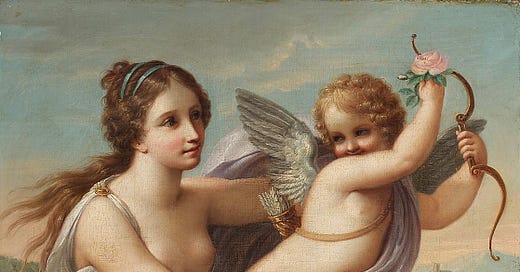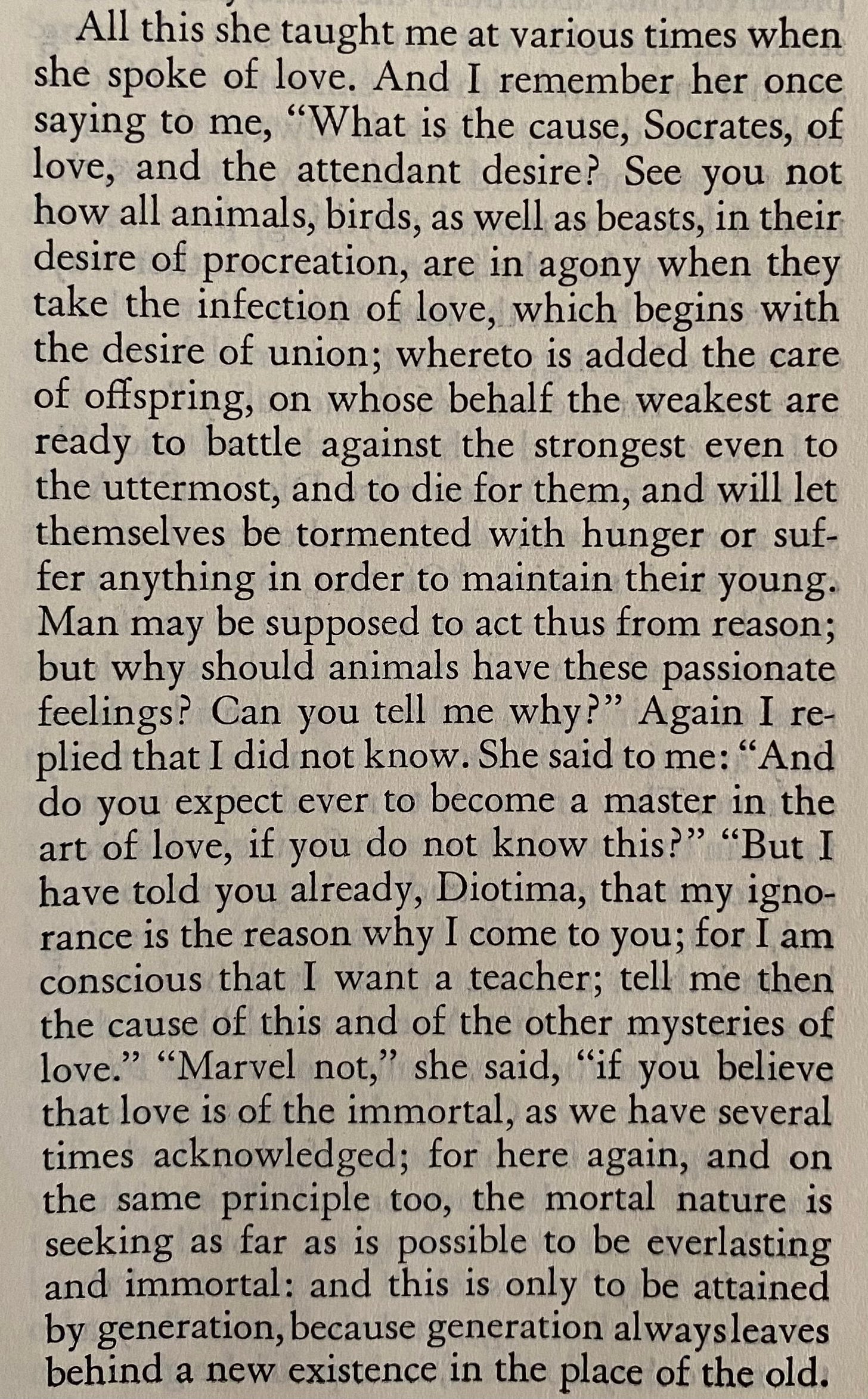In light of the recent majority decision made by the supreme court of the United States of America, I thought it no better time than to discuss the topic than while the subject is on the minds of the masses. Many people have heard arguments from either side, perhaps even participating in them themselves, taking up the side of moral virtue depending on their prior beliefs and convictions held before the debate. Now I am here to offer you an argument from the past, one almost 2,500 years old from Diotima Mantinea, whose name literally means Diotima prophet of victory.
Diotima was something of an oracle, a woman chosen by the Gods to bring prophecies to mankind, and instruct them on several matters. In one of Plato’s most famous dialogues, the Symposium, she is talking to a young Socrates, somewhere in the middle of the 5th century BC. Socreates goes forth seeking the council of Diotima Manitea, a highly respected woman in ancient Athens. In a rare moment amongst Plato’s dialogues, Socrates plays the role of the student, not the teacher. Here Socrates presents to Diotima his question about the nature of Eros, the God of Love, and she begins to recount both his affects on the world, as well as his nature and genesis.
Angelica Kaufmann’s painting, The Victory of Eros.
For the Greeks, as well as other Indo Europeans of the iron age as well as the bronze and even copper ages, death was not viewed as the end. The ancient Greeks believed in three separate systems revolving around death that give them a unique perspective on life.
Of the first belief, the ancient Greeks, at least in part, believed in a system of reincarnation, being brought back to life every few thousand years in a new body, fated to repeat life until some enlightenment and Nirvana was reached as one was Sublimated with Zeus, the supreme God. Quite the beautiful belief.
Second, the ancient Greeks had a practice, similar to that of other ancient Indo-European groups revolving around the Koryos, or in English, the warband. In short, young men would enter the warband as a right of passage, leaving behind their families and entering the group of men where they would be initiated into a cult-like practice of becoming a werewolf by skinning and dawning the pelt of a wolf, usually while on some sort of drug. This can be viewed as their death. As these young men proved their metal so to speak in battle, they would later return to civil society and take off the pelt of the wolf, reliving some sort of rebirth. Yet while in the Koryos, they could not die, for they were already not living, because they were aspects of death themselves as wolves, a highly symbolic creature of death and the underworld within ancient Indo-European societies.
Third was the belief in Kleos, or renown or glory in English, closely related to the word Kleon in ancient Greek, meaning to hear. It was the eternal glory passed from the father to the son, which persisted far after the death of the father. This eternal glory has many cognates in other cultures, but it is best described as the legacy one passes down, and is viewed as a piece of the man that exists far after his death, a type of immortality.
Coming back to Diotima and Socrates, their discussion of Eros leads them to discuss the nature of love. In this discussion, she says that love is immortal, existing far after the death of any one man. She describes men going through perpetual change, not at once the same man he was from that of youth to the aged, but being described under some kind of continuity of being despite this change. This is important, because she believes that the propagation of life, is likened to that of the passing on of an eternal flame, from father to son, just like that of Kleos.
Diotima earlier said how love even effects less intelligent beasts, citing that they are willing to defend the lives of their young, even if they are starving themselves, leaping in certain danger and receiving either a minor or mortal wound, costing them their lives. In much the same way, a father would and should lay down his life to defend his child, on the basis that if the father should die, his son’s flame of life and his kleos should live on, yet if the son dies and the father lives the father will be ashamed of his inability to protect his son, and sad at the passing of his son, the flame of life, and his kleos.
Bringing the lessons of old out from the shadows of history and into the light of the modern age, we can view them for what they are and in their context. Yet as times change over the generations, the centuries, and even the milennia, men stay the same. Viewing the topic of abortion through the Athenian lens of love and of life, abortion can be viewed as a form of self destruction, akin to that of suicide. In the killing of one’s own offspring, they are in fact snipping the thread of fate that binds their life to this world, and extinguishing the flame of life that they were in the process of passing on.
Some people may call those who kill their own children evil, and perhaps a portion of their being is. However, I wish for those reading this to view them not as evil, but as self-loathing. For they do not love themselves enough to pass on the flame of life from their hands to their children’s hands. They do not love themselves enough to allow themselves to intermingle life with the person they most love in life, their wife or husband. They loathe themselves, they loathe their image, they loathe life. These people exist because society has failed in nurturing a powerful spirit full of vitality within them, pushing out the self hatred and ugliness within them. Not all men and women can be saved from themselves, but the growing number of abortionists and filicide, that of the killing of one’s own child, falls on the shoulders of the society that has fostered the growth of such cancerous ideologies.
Looking to the future, men can change this. The age of death and destruction is already here, not ahead. If the changing of the ages is to come, men must stand together in virtue, fostering kinships that reach beyond mere blood, and permeate the culture that they live in today, for a future they wish to see tomorrow.
Carthago delenda est.








Excellent Presentation.